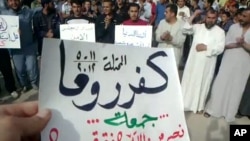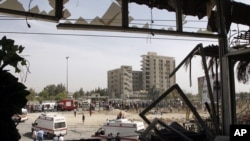Mass protests broke out across Syria on Friday, a day after at least 55 people were killed in twin bombings that marked the deadliest attack since the start of the anti-government uprising 14 months ago.
The car bomb explosions in Damascus Thursday were among a string of attacks that have occurred since U.N. observers arrived in Syria to monitor a shaky cease-fire brokered by international envoy Kofi Annan.
State television reported Friday that troops killed a suspected suicide bomber in the northern city of Aleppo. The report said the would-be attacker's car was filled with 1,200 kilos of explosives.
The Syrian government on Friday urged the U.N. Security Council to take action to combat terrorism, in the wake Thursday's blasts.
State media said the government made the plea in letters to the Security Council and U.N. chief Ban Ki-moon. It said "escalating crimes" were proof that Syria is facing terrorist attacks led by groups receiving foreign support.
Monitors fan out
U.N. observers toured Damascus on Friday as protesters against the government of President Bashar al-Assad gathered in several cities and towns. There were unconfirmed reports of some injuries.
Observer mission spokesman Neeraj Singh said the number of international monitors and staff members taking part in the mission had grown to 50.
"You have the world coming together, the world community coming together to be with the people of Syria to see in what way we can help," he said. "The most important thing being that violence in all its forms has to stop."
Syria - Damascus Attacks Factbox
- There have been several attacks in Damascus since the anti-government uprising began 14 months ago. These were the most deadly:
- December 2011: Two suicide bombings kill 44 people outside an intelligence compound.
- January 2012: A suicide blast kills 25 people, many of them police, at an intersection.Text
- March 2012: Two car bombs kill 27 people near intelligence and security buildings.Text
- April 2012: Explosions kill 10 people.Text
- May 2012: Twin bombings kill 55 people.
"What we’re seeing in Syria now is a very dangerous escalation of violence. It is becoming a lot more deadly, a lot more sophisticated," said terror analyst MJ Gohel.
Gohel is executive director of the London-based Asia-Pacific Foundation. He said the twin suicide bombings in Damascus bear all the hallmarks of an al-Qaida attack, with the first blast designed to scare people out of their offices and buildings, and right into the second blast.
But Gohel warned it would be premature to blame al-Qaida.
"Ayman al-Zawahiri, who is now the leader of al-Qaida, has issued a number of messages urging the rebels in Syria to join the cause of al-Qaida but he has found no traction there whatsoever," he said.
Outside forces blamed
Still, that has not stopped both the Syrian government and opposition groups from pointing a finger at the terrorist organization.
The head of Syria's main opposition group, in Tokyo Friday, blamed the Damascus bombings on al-Qaida-linked forces with ties to the Syrian government. Burhan Ghalioun accused the government of trying to sabotage the peace plan brokered by international envoy Kofi Annan.
Jeffrey White, a defense fellow at the Washington Institute and former analyst with the U.S. Defense Intelligence Agency, said such a scenario is certainly plausible. He added that there is a strong belief within the intelligence community that the Assad regime has ties with al-Qaida in Iraq.
But it's unlikely government forces would attack supporters, he said.
"For the regime to attack either directly or indirectly its own primary supporting mechanisms seems a little bit of a stretch," White said. "Many of these attacks are against the very forces the regime depends on for it survival."
The Assad government accuses the opposition forces of siding with al-Qaida, something Bassam Imadi with Syrian National Council, strongly denied.
"The opposition doesn't benefit from that," he said from Istanbul Friday. "The opposition or the fighters on the ground, the Free Syrian Army or other people who are working with the Free Syrian Army, do not have the means or the explosives to start such explosions."
Some analysts say that the opposition is an unlikely culprit.
"Suicide bombings are the hallmark of religious extremism, the kind of distorted version of Islam," said Arie Kruglanski, a terror expert and professor of psychology at the University of Maryland. "I do not think that in the name of democracy or in the name of good governance people would be ready to commit suicide. Religion and jihadism are very powerful justifying ideology."
Anger builds
Kruglanski said what the emergence of suicide bombers may indicate most strongly is the level of anger and frustration building within Syria.
"It is possible that there is a rage and tremendous anger at the government which makes it easier to commit suicide bombing in order to take vengeance," he said.
Analysts say it will likely take time to determine exactly who is responsible for the growing number of bombings and suicide attacks. In the meantime, they warn Syria could become mired in a ever-messier conflict that could well descend into civil war.
And, if groups like al-Qaida do not have a strong foothold in Syria now, the escalating conflict could serve as an open invitation.
"Al-Qaida's strategy has always been to go into any country where there has been a breakdown of any kind of law and order and to perpetrate violence," Gohel said. "And they would hope that in that chaos that they would have the capability to fill the vacuum and establish some kind of foothold, which they have done for instance in countries in the past like Afghanistan."
| Join the conversation on our social journalism site - Middle East Voices. Follow our Middle East reports on Twitter and discuss them on our Facebook page. |














